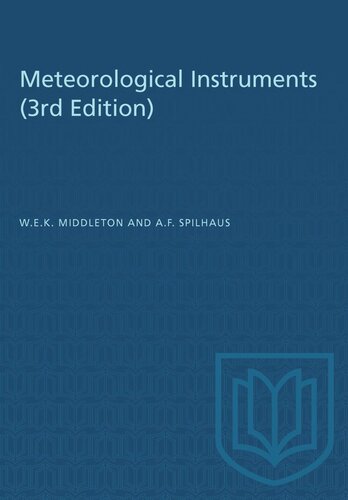

Most ebook files are in PDF format, so you can easily read them using various software such as Foxit Reader or directly on the Google Chrome browser.
Some ebook files are released by publishers in other formats such as .awz, .mobi, .epub, .fb2, etc. You may need to install specific software to read these formats on mobile/PC, such as Calibre.
Please read the tutorial at this link. https://ebooknice.com/page/post?id=faq
We offer FREE conversion to the popular formats you request; however, this may take some time. Therefore, right after payment, please email us, and we will try to provide the service as quickly as possible.
For some exceptional file formats or broken links (if any), please refrain from opening any disputes. Instead, email us first, and we will try to assist within a maximum of 6 hours.
EbookNice Team

Status:
Available5.0
36 reviews
ISBN 13: 9781487572013
Author: WEK Middleton, AF Spilhaus
Since its first appearance in 1941, this book has remained, through various editions and reprintings, the standard, indeed the only modern work in English in its field. This third edition, completely reset, includes descriptions of the newer devices which have come into use in upper-atmosphere sounding, electronic techniques for wind finding, thunderstorm location, and through the renewed interest in meterorological observations from aircraft. A number of new illustrations have been added.
The authors have followed the pattern of the earlier editions in presenting examples found in regular weather service. Some attention has been given, however, to new techniques which, though not widely in use at the present time, show such promise as to deserve the studen'ts attention. A general treatment of the application of radar, radio direction finders, and radiosoundes to meteorology has been included.
Of the previous edition the bulletin of the American Meteorological Society said: "This is the first general textbook on the subject in English for more than half a century .... While the book is indispensable for reference for the practising meterorologist, the needs of the student are met by an adequate presentation of theoretical topics."
I. INTRODUCTION: PROPERTIES OF METEOROLOGICAL INSTRUMENTS
general properties of scientific instruments
special characteristics of meteorological instruments
characteristics of recording instruments in general
control of recording instruments by eye readings of non-recording instruments
II. THE MEASUREMENT OF ATMOSPHERIC PRESSURE
general principles and methods
discussion of units of pressure
general errors of pressure measurements
the mercury barometer
elastic barometers
the hypsometer
pressure variographs and variometers
III. THE MEASUREMENT OF TEMPERATURE IN METEOROLOGY
scope of the chapter. definition of temperature. units
exposure of thermometers
the lag coefficients of meteorological thermometers
classification of meteorological thermometers
liquid-in-glass thermometers
deformation thermometers
liquid-in-metal thermometers
electrical thermometers
the testing of thermometers and thermographs
checking thermographs against thermometers in the screen
IV. THE MEASUREMENT OF ATMOSPHERIC HUMIDITY
introduction: units of measurement
classification of methods of humidity measurement
the psychrometer
the hair hygrometer
the dew-point hygrometer
absorption hygrometry
diffusion hygrometers
optical hygrometers
hygrometer calibration techniques
V. THE MEASUREMENT OF PRECIPITATION AND EVAPORATION
general considerations
the ordinary rain gauge
recording rain gauges
totalizers
rate-of-rainfall recorders
measurement of snow
exposure of rain and snow gauges
rainfall measurements by radar
measurement of dew: drosometers
measurement of evaporation
VI. THE MEASUREMENT OF WIND NEAR THE SURFACE
general considerations: units
wind vanes
the measurement of wind speed: classification of anemometers
rotation anemometers
pressure-plate anemometers
bridled anemometers
pressure-tube anemometers
anemometers making use of the cooling powers of the air
exposure of wind instruments
VII. THE MEASUREMENT OF UPPER WINDS BY MEANS OF PILOT BALLOONS
general remarks
balloons
theodolites for following balloons
methods of observation and computation
general accuracy of pilot-balloon results
upper winds by radio and radar
controlled-altitude free balloons
VIII. INSTRUMENTS FOR INVESTIGATING CLOUDS
the measurable attributes of clouds
cloud amount
cloud direction
speed of motion
measurement of cloud height
the structure of clouds
cloud photography
sferics
radar meteorology
IX. SUNSHINE RECORDERS
general considerations
the campbell-stokes recorder
the jordan sunshine recorder
the pers sunshine recorder
the marvin sunshine recorder
sunshine intensity recorders
X. INSTRUMENTS FOR THE INVESTIGATION OF THE UPPER AIR
introduction
sounding balloons
sounding-balloon meteorographs (without radio)
special applications of sounding balloons
aircraft observations
radiosondes: general remarks and classification
the time-interval radiosonde
code-type radiosonde
the variable-radio-frequency-type radiosonde
variable-audio-frequency radiosonde
the errors of radiosondes
constant-level-balloon radiosondes
special uses of radiosondes
calibration apparatus
radio wave soundings
XI. SPECIAL METEOROLOGICAL ASSEMBLIES AND SYSTEMS
general
portable packaged weather stations
mobile meteorological stations
automatic weather stations
the complete weather instrument – an atmospheric intelligence system
meteorological questions
weather instruments quizlet
weather instruments questions
weather instruments quiz pdf
weather instruments quiz
Tags: WEK Middleton, AF Spilhaus, Meteorological